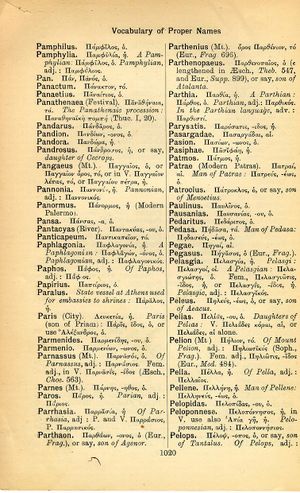Pandarus: Difference between revisions
From LSJ
ἐν πιθήκοις ὄντα δεῖ εἶναι πίθηκον → in Rome we do as the Romans do | when in Rome, do as the Romans do | when in Rome, do as the Romans | when in Rome, do like the Romans do | when in Rome | being among monkeys one has to be a monkey
m (Text replacement - "}}]]" to "}}]]") |
m (Text replacement - "(|thumb)\n(\|link=)" to "$1$2") |
||
| Line 1: | Line 1: | ||
{{WoodhouseENELnames | {{WoodhouseENELnames | ||
|Text=[[File:woodhouse_1020.jpg|thumb | |Text=[[File:woodhouse_1020.jpg|thumb|link={{filepath:woodhouse_1020.jpg}}]]Πάνδαρος, ὁ. | ||
|link={{filepath:woodhouse_1020.jpg}}]]Πάνδαρος, ὁ. | |||
}} | }} | ||
{{Lewis | {{Lewis | ||
Revision as of 16:55, 18 May 2020
English > Greek (Woodhouse)
Πάνδαρος, ὁ.
Latin > English (Lewis & Short)
Pandărus: i, m.
I A leader of the Lycians, auxiliary of the Trojans, Verg. A. 5, 496.—
II A son of Alcanor, companion of Æneas, slain by Turnus, Verg. A. 9, 672 sq.; 11, 396.
Latin > French (Gaffiot 2016)
Pandărus,¹⁴ ī, m., compagnon d’Énée, tué par Turnus : Virg. En. 9, 672 || fils de Lycaon : Virg. En. 5, 496.

